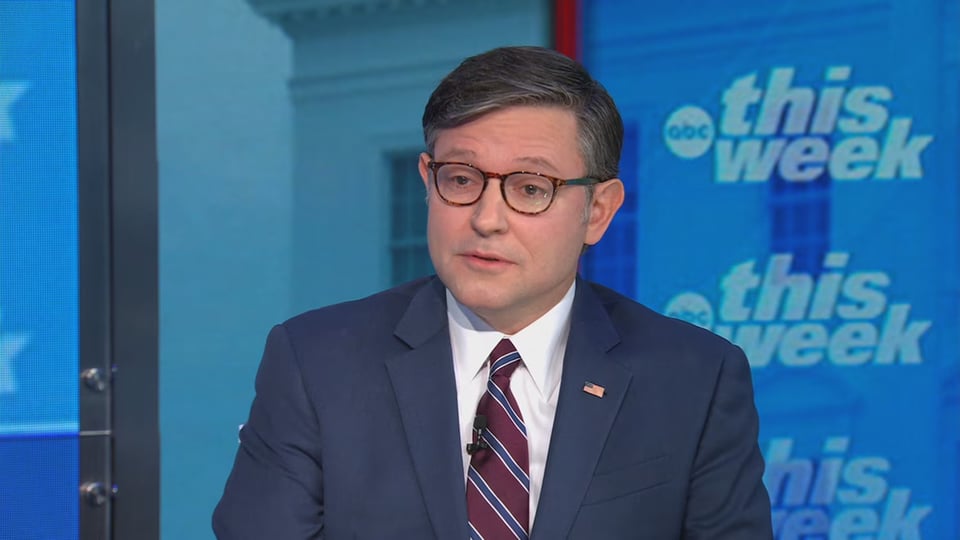The Speaker Who Stopped Speaking
The Founders feared a king. They didn’t expect a Speaker who’d hand him the crown.

Mike Johnson has turned congressional silence into an art form—and the convicted felon into the nation’s only branch of government.
It has now been more than a month since the House of Representatives did anything resembling work. No votes. No debates. No hearings. No spending bills. No oversight. The people’s House, in theory the beating heart of American democracy, has been reduced to a faint murmur under Speaker Mike Johnson’s “indefinite hiatus.” The lights are on, the marble halls are empty, and the Constitution is collecting dust.
Johnson’s defenders call this a strategy. In reality, it’s an abdication. The Founders gave the House one singular, irreplaceable power: the power of the purse. By refusing to convene, Johnson has effectively handed that power to the convicted felon—who already believes he holds the other two branches. When the man who controls the budget decides to stop showing up, the separation of powers isn’t under strain. It’s gone missing.
This isn’t the usual Washington gridlock. Gridlock requires motion—forces pulling in opposite directions. What we have instead is stasis, a deliberate freezing of the legislative process. Johnson is using inaction as submission. The Speaker of the House has become the Speaker of Nothing.
According to The New York Times, Trump now jokes privately, “I’m the speaker and the president.” Johnson has done little to contest the point. That silence, more than any policy dispute, tells the story. Where previous speakers—Republican and Democrat alike—fought to assert the independence of Congress, Johnson has decided to run the House like a satellite office of Mar-a-Lago. The Constitution, in his hands, is less a governing document than a loyalty pledge.
And so, the House has vanished. Its members are scattered across the country, “working remotely,” which in Congress is another way of saying not at all. No floor debates, no committee hearings, not even the symbolic votes that used to fill the news cycle during a shutdown. Mike Johnson has discovered the legislative equivalent of a government-supplied hammock.
Former Speaker Newt Gingrich calls this smart politics—keeping Republicans from “sending mixed messages.” That’s one way to describe it. Another is rule by fear: a leader so beholden to a cult of personality that the mere sound of dissent must be preemptively smothered. It’s legislative management by ghosting.
Even Steve Bannon, of all people, is aghast. He wants the “Trump revolution codified” into law, only to find that Johnson’s doing nothing at all. When Bannon thinks you’re not doing enough to enable authoritarianism, that should probably set off alarms.
Instead, Johnson doubles down—refusing to swear in a duly elected Democrat, Adelita Grijalva, on the bizarre claim that he “lacks the authority” to administer the oath because the House isn’t in session. In other words: I can’t do my job because I decided not to do my job. If Joseph Heller were still alive, he’d be demanding royalties.
The consequences stretch far beyond procedural absurdity. Every day the House sits idle, a generation of younger members learns that this is what congressional leadership looks like: the Speaker as caretaker of inaction, the chamber as a backdrop for the president’s monologues. As Brookings’ Molly Reynolds warned, these habits become precedent. Future speakers will look back not on the fiery clashes of Sam Rayburn or Nancy Pelosi, but on Mike Johnson’s long, obedient silence—and mistake it for statesmanship.
What’s left is a legislature that behaves less like the U.S. Congress and more like, as Bannon himself put it, “the state Duma.” Except the Russian Duma at least meets. Ours doesn’t even bother to fake it. This is what autocracy looks like in American vernacular: not tanks in the streets, but a Speaker who sends everyone home.
And Johnson’s loyalty is rewarded. He praises the convicted felon’s every move, even the grotesque ones—the AI-generated video of a bomber dumping feces on protesters, the demolition of the East Wing to build a ballroom, the commutation of George Santos. Johnson no longer even pretends to lead. He exists to applaud.
It would be tempting to dismiss all this as political theater, but the curtain’s already dropped. The stage is empty. The only actor left is the convicted felon, writing and performing every line himself. The House has become a prop—one that claps on cue when called back to town.
When historians look back at this period, they may well see 2025 not as the year of a shutdown, but as the year Congress shut down itself. Mike Johnson didn’t just marginalize his office; he made legislative irrelevance an official policy. It’s the quietest coup in American history—not with violence or decrees, but with the slow suffocation of silence.
The Constitution still says the House of Representatives makes the laws. But at the moment, only one man seems to believe he does. And the Speaker, who could change that with a single gavel strike, would rather stay home.